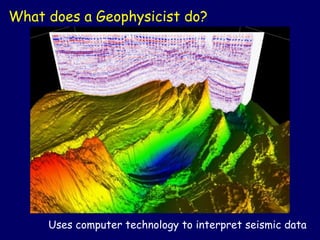All Categories
Featured
Table of Contents
For The Future Of Geophysics, Not Even The Sky Is The Limit in Mindarie WA 2023

(PREM)., and the boundaries in between layers of the mantle are consistent with phase transitions.

Schematic of Earth's magnetosphere. Flows from left to.
Inside the magnetosphere, there are fairly thick areas of solar wind particles called the Van Allen radiation belts. Geophysical measurements are usually at a particular time and place.
Recent Advances In Optimized Geophysical Survey Design in Gwelup Oz 2022
A three-dimensional position is calculated utilizing messages from 4 or more noticeable satellites and described the 1980 Geodetic Reference System. An option, optical astronomy, integrates huge collaborates and the local gravity vector to get geodetic coordinates. This technique only offers the position in 2 collaborates and is more difficult to utilize than GPS.
Relative positions of 2 or more points can be figured out utilizing very-long-baseline interferometry. Gravity measurements entered into geodesy because they were required to associated measurements at the surface of the Earth to the recommendation coordinate system. Gravity measurements on land can be used gravimeters deployed either on the surface or in helicopter flyovers.
Satellites in space have made it possible to gather data from not only the noticeable light area, but in other locations of the electro-magnetic spectrum. The worlds can be defined by their force fields: gravity and their magnetic fields, which are studied through geophysics and area physics. Determining the modifications in velocity experienced by spacecraft as they orbit has enabled fine information of the gravity fields of the worlds to be mapped.
Course: Basics In Geophysical Surveying in Koongamia WA 2023

Given that geophysics is interested in the shape of the Earth, and by extension the mapping of functions around and in the world, geophysical measurements include high accuracy GPS measurements. These measurements are processed to increase their precision through differential GPS processing. As soon as the geophysical measurements have been processed and inverted, the translated results are plotted utilizing GIS.
Many geophysics companies have developed in-house geophysics programs that pre-date Arc, GIS and Geo, Soft in order to meet the visualization requirements of a geophysical dataset. Expedition geophysics is used geophysics that typically utilizes remote sensing platforms such as; satellites, airplane, ships, boats, rovers, drones, borehole noticing devices, and seismic receivers.
For instance, aeromagnetic information (airplane gathered magnetic data) gathered utilizing traditional fixed-wing airplane platforms need to be fixed for electro-magnetic eddy currents that are created as the airplane moves through Earth's magnetic field. There are likewise corrections connected to changes in determined prospective field strength as the Earth turns, as the Earth orbits the Sun, and as the moon orbits the Earth.
Geophysicist Salary in Brentwood Western Australia 2022
Signal processing includes the correction of time-series information for unwanted sound or mistakes introduced by the measurement platform, such as aircraft vibrations in gravity data. It likewise involves the reduction of sources of noise, such as diurnal corrections in magnetic data. In seismic data, electromagnetic data, and gravity data, processing continues after mistake corrections to consist of computational geophysics which lead to the final analysis of the geophysical data into a geological interpretation of the geophysical measurements Geophysics emerged as a separate discipline just in the 19th century, from the crossway of physical geography, geology, astronomy, meteorology, and physics.
The magnetic compass existed in China back as far as the fourth century BC. It was utilized as much for feng shui as for navigation on land. It was not until excellent steel needles could be forged that compasses were used for navigation at sea; prior to that, they might not keep their magnetism long enough to be beneficial.
By taking a look at which of eight toads had the ball, one might identify the instructions of the earthquake. It was 1571 years before the very first design for a seismoscope was released in Europe, by Jean de la Hautefeuille. It was never developed. Among the publications that marked the start of modern science was William Gilbert's (1600 ), a report of a series of meticulous experiments in magnetism.
Geophysical Exploration in Leederville Aus 2020
In 1687 Isaac Newton published his, which not just laid the foundations for classical mechanics and gravitation Also explained a variety of geophysical phenomena such as the tides and the precession of the equinox. The very first seismometer, an instrument capable of keeping a continuous record of seismic activity, was developed by James Forbes in 1844. Dietmar; Sdrolias, Maria; Gaina, Carmen; Roest, Walter R. (April 2008). "Age, spreading out rates, and spreading out asymmetry of the world's ocean crust". Geochemistry, Geophysics, Geosystems. 9 (4 ): Q04006. Bibcode:2008 GGG ... 9. 4006M. doi:10. 1029/2007GC001743. S2CID 15960331. "Earth's Inconstant Magnetic Field". science@nasa. National Aeronautics and Space Administration. 29 December 2003. Obtained 13 November 2018.
Runcorn, S.K, (editor-in-chief), 1967, International dictionary of geophysics:. Pergamon, Oxford, 2 volumes, 1,728 pp., 730 fig Geophysics, 1970, Encyclopaedia Britannica, Vol. Introduction to seismology (Second ed.).
Latest Posts
Geophysical Survey in Jandakot Australia 2020
Geophysics Definition & Meaning in Roleystone Oz 2021
Geophysical Survey - Explore The Seafloor in Kinross WA 2021